
Senior writer Tina Hesman Saey is a geneticist-turned-science writer who covers all things microscopic and a few too big to be viewed under a microscope. She is an honors graduate of the University of Nebraska-Lincoln where she did research on tobacco plants and ethanol-producing bacteria. She spent a year as a Fulbright scholar at the Georg-August University in Göttingen, Germany, studying microbiology and traveling. Her work on how yeast turn on and off one gene earned her a Ph.D. in molecular genetics at Washington University in St. Louis. Tina then rounded out her degree collection with a master’s in science journalism from Boston University. She interned at the Dallas Morning News and Science News before returning to St. Louis to cover biotechnology, genetics and medical science for the St. Louis Post-Dispatch. After a seven year stint as a newspaper reporter, she returned to Science News. Her work has been honored by the National Academies of Sciences, Engineering and Medicine, the Endocrine Society, the Genetics Society of America and by journalism organizations.

Trustworthy journalism comes at a price.
Scientists and journalists share a core belief in questioning, observing and verifying to reach the truth. Science News reports on crucial research and discovery across science disciplines. We need your financial support to make it happen – every contribution makes a difference.
All Stories by Tina Hesman Saey
-
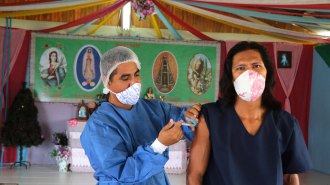 Health & Medicine
Health & MedicineHere’s what makes 4 promising COVID-19 vaccines unique — and potentially useful
More vaccines still in the works are exploring a variety of approaches, including pills and electrical zaps.
-
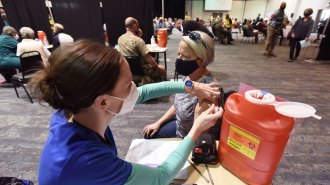 Health & Medicine
Health & MedicineThe COVID-19 pandemic is now a year old. What have scientists learned?
As we enter the pandemic’s second year, researchers share what they’ve learned and what they look forward to.
-
 Health & Medicine
Health & MedicinePeople fully vaccinated against COVID-19 can socialize without masks, CDC says
Two weeks after their final COVID-19 shot, people can visit other vaccinated people indoors without masks or physical distancing.
-
 Health & Medicine
Health & MedicineMost pro athletes who got COVID-19 didn’t develop heart inflammation
Few professional athletes developed heart inflammation after a bout of COVID-19, but how the findings relate to the general public isn’t clear.
-
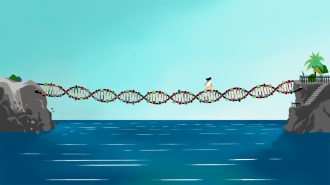 Genetics
GeneticsDNA databases are too white, so genetics doesn’t help everyone. How do we fix that?
A lack of diversity in genetic databases is making precision medicine ineffective for many people. One historian proposes a solution: construct reference genomes for individual populations.
-
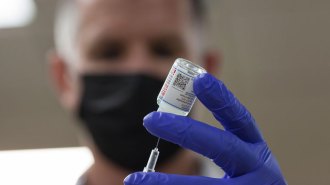 Health & Medicine
Health & MedicinePeople who have had COVID-19 might need only one shot of a coronavirus vaccine
Antibody levels in health care workers who had COVID-19 and got vaccinated were more than 500 times higher than those vaccinated but never infected.
-
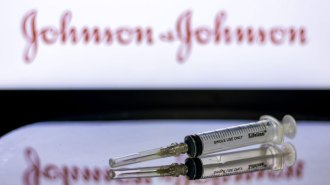 Health & Medicine
Health & MedicineWhat you need to know about J&J’s newly authorized one-shot COVID-19 vaccine
Even as a third COVID-19 vaccine becomes available in the United States, questions remain over how well it works and if people will take it.
-
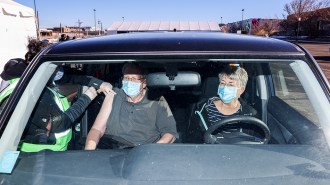 Health & Medicine
Health & MedicineCan a COVID-19 vaccine’s second dose be delayed? It’s complicated
New data indicate that delaying second doses of COVID-19 vaccines may still provide protection, but some scientists aren’t convinced it’s OK.
-
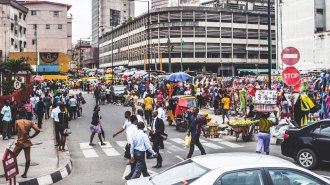 Genetics
GeneticsThe first human genetic blueprint just turned 20. What’s next?
The Human Genome Project led to many medical advances. Deciphering 3 million African genomes and using new tech to fill gaps could lead to even more.
-
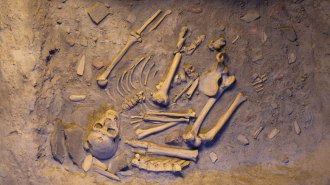 Health & Medicine
Health & MedicineSome Neandertal genes in people today may protect against severe COVID-19
Neandertal DNA on chromosome 12 may affect genes involved in a biochemical chain reaction that ends with the destruction of viral RNA.
-
 Health & Medicine
Health & MedicineMaking masks fit better can reduce coronavirus exposure by 96 percent
Double masking, rubber bands and other hacks can produce a tighter fit and prevent aerosol particles that can carry coronavirus from getting through.
-
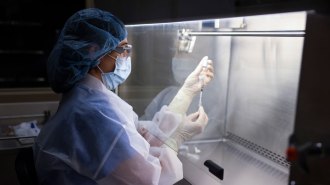 Health & Medicine
Health & MedicineOne-shot COVID-19 vaccine is effective against severe disease
The effectiveness of Johnson & Johnson’s vaccine at preventing hospitalization and death holds up against a South Africa variant of the coronavirus.